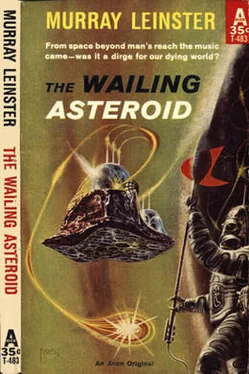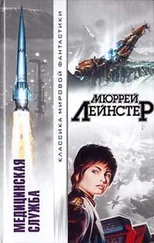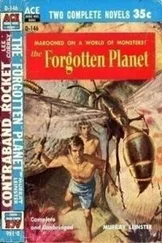"I'm going to ask you to do something for me," she said. "When we went down to the Lower Levels, I thought I saw something moving. Something alive."
"Nerves," said Burke. "There couldn't be anything alive in this place. Not after so many years without air."
"I know," acknowledged Sandy. "I know it's ridiculous. But Pam's felt creepy, too, as if there were something deadly somewhere in the rooms we've never been in."
Burke moved his head impatiently. "Well?"
"Holmes found some hand–weapons," said Sandy. "They don't work, of course. Will you fix one for Pam and one for me so that they do?" She paused and added, "Of course it doesn't matter whether we're frightened or not, considering. It doesn't even matter whether there is something alive. It doesn't matter if we're killed. But it would be pleasant not to feel defenseless."
Burke shrugged. "I'll fix them."
She put three of the transparent–barreled weapons before him and said, "I'm going up to the instrument–room and help Pam with her coding."
She went out. Burke took the three hand–weapons and looked at them without interest. But in a technician of any sort there is always some response to a technical problem. A trivial thing like a hand–weapon out of order could hold Burke's attention simply because it did not refer to the coming disaster.
He loosened the hand–grip plates and looked at the completely simple devices inside the weapons. There was a tiny battery, of course. In thousands of years its electrolyte had evaporated. Burke replaced it from the water stores of the ship. He did the same to the other two weapons. Then, curious, he stepped out of the ship's air–lock and aimed at the ship–lock wall. He pressed the trigger. There was a snapping sound and a fragment of rock fell. He tried the others. They fired something. It was not a bullet. The barrels of the weapons, on inspection, were not hollow. They were solid. The weapons fired a thrust, a push, an immaterial blow which was concentrated on a tiny spot. They punched, with nothing solid to do the punching.
"Probably punch a hole right through a man," said Burke, reflectively.
He took the three weapons and went toward the instrument–room. On the way, his mind went automatically back to the coming destruction. It was completely arbitrary. The Enemy had no reason to destroy the human race in this solar system. Men, here, had lost all recollection of their origin and assuredly all memory of enmities known before memory began. If any tradition remained of the fortress, even, it would be hidden in tales of a Golden Age before Pandora was, or of an Age of Innocence when all things came without effort. Those stories were changed out of all semblance to their foundations, of course, as ever–more–ignorant and ever–more–unsophisticated generations retold them. Perhaps the Golden Age was a garbled memory of a time when machines performed tasks for men—before the machines wore out and could not be replaced without other machines to make them. Perhaps the slow development of tools, with which men did things that machines formerly did for them, blurred the accounts of times when men did not need to use tools. Even the everywhere–present traditions of a long, long journey in a boat—the flood legends—might be the last trace of grand–sires' yarns about a journey to Earth. It would have been modified by successive generations who could not imagine a journey through emptiness, and therefore devised a flood as a more scientific and reasonable explanation for myths plainly overlaid with fantasy and superstition.
Burke went into the instrument–room as Sandy was asking, "But how did they? We haven't found any ship–lock except the one we came in by! And if a ship can't travel faster than light without wrapping artificial mass about itself … "
Holmes had taken off his helmet He said doggedly, "There's nothing about ships in the cubes. Anyhow, the nearest other sun is four light–years away. Nobody'd try to carry all the food a whole colony would need from as far away as that! If they'd used ships for supply, there'd have been hydroponic gardens all over the place to ease the load the ships had to carry! There was some other way to get stuff here!"
"Whatever it was, it didn't bring meat from Earth. That was hauled out, fastened to the outside of service–boats."
"Another thing," Holmes said. "There were thousands of people in the garrison, here. How did the air get renewed? Nobody's found any mention of air–purifying apparatus in the cubes. There's been no sign of any! An emergency air–supply, yes. It was let loose when we came into the ship–lock. But there's no regular provision for purifying the air and putting oxygen into it and breaking down the CO 2!"
"Won't anyone believe I smelled fresh air yesterday?" Pam asked plaintively.
No one commented. It could not be believed. Burke handed Sandy one of the weapons. He gave Pam a second.
"They work very much like the ship–drive, which was developed from them. A battery in the handle energizes them so they use the heat they contain to make a lethal punch without a kick–back. They'll get pretty cold after a dozen or so shots."
He sat down and Holmes went on almost angrily, "The garrison had to get food here. It didn't come in ships. They had to purify the air. They've nothing to do it with! How did they manage?"
Keller smiled faintly. He pointed to a control on the wall.
"If that worked, we could ask. It is supposed to be communication with base. It is turned on. Nothing happens."
"Do you know what I'm thinking?" demanded Holmes. "I'm thinking of a matter–transmitter! It's been pointed out before that we'll never reach the stars in spaceships limited to one light–speed. What good would be voyages that lasted ten, twenty, or fifty years each way? But if there could be matter–transmitters—"
Keller said gently, "Transmitters, no. Transposers, yes."
It was a familiar enough distinction. To break down an object into electric charges and reconstitute it at some distant place would be a self–defeating operation. It could have no actual value. To transmit a hundred and fifty pounds of electric energy—the weight of a man converted into current—would require the mightiest of bus–bars for a conductor, and months of time if it was not to burn out from overload. The actual transmission of mass as electric energy would be absurd. But if an object could simply be transposed from one place to another; if it could be translated from place to place; if it could undergo substitution of surroundings…. That would be a different matter! Transposition would be instantaneous. Translation would require no time. Substitution of position—a man who was here this instant would be there the next—would have no temporal aspect. Such a development would make anything possible. A ship might undertake a voyage to last a century. If a matter–transposer were a part of it, it could be supplied with fuel and air and foodstuffs on its voyage. Its crew could be relieved and exchanged whenever it was desired. And when it made a planet–fall a hundred years and more from home, why, home would still be just around the transposer. With matter–transposition an interstellar civilization could arise and thrive, even though limited to the speed of light for its ships. But a culture spread over hundreds of light–years would be unthinkable without something permitting instant communication between its parts.
"All right!" said Holmes doggedly. "Call them transposers! This fortress had to be supplied. We've found no sign that ships were used to supply it. It needed to have its air renewed and refreshed. We've found no sign of anything but emergency stores of air in case some unknown air–supply system failed. What's the matter with looking for a matter–transposer?"
Читать дальше







